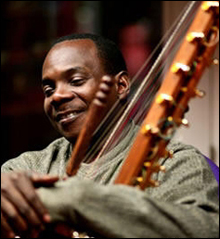
Toumani Diabaté
|
Toumani Diabaté is not just on tour, he’s on a mission. As he explained from the stage of the Somerville Theatre a week ago Thursday, his Symmetric Orchestra represents a “reunification of the old Mande empire, in cultural terms.” Drawing on musicians from across West Africa’s post-colonial national divides — Mali (Toumani’s home), Guinea, Gambia, Senegal, Ivory Coast, Burkina Faso, Guinea Bissau — this is “a federative orchestra,” as Toumani has elsewhere described it. Unification is at the root of the musical æsthetic as well, since the group bring traditional Mande instruments — balafon, ngoni, djembe — into dialogue with their modern equivalents: keyboard, electric guitar, trap drums.
At the center of this symmetrical arrangement, however, is Toumani’s own kora, the 21-string harp-like instrument of which he is a master and for which there is no equivalent in contemporary popular ensembles. In his dazzling solo feature, he sounded like an entire orchestra himself. The kora has by tradition been a solo instrument, used for centuries as vocal accompaniment by the jeli, or griot; its placement at the center of a modern ensemble is another twist on tradition. But the way the sound of Toumani’s kora dissolved into that of his ensemble is just another of his aims. The very name Symmetric Orchestra, he says, was chosen “to show that the balance between all the elements is even, complementary, each instrument contributing to the whole, equally, to create a groove, a flow.”
That groove was abundant. The Symmetric Orchestra is made up of exceptional soloists — Fodé Lassana Diabaté’s virtuosic, jazz-inflected balafon was only one among many displays of grace, taste, and skill. But it’s the ensemble that’s the point. And when near the end of the show Toumani called up a local Boston guitarist, Chris Chitouras, to join the band, the gesture was extended to the community as well.